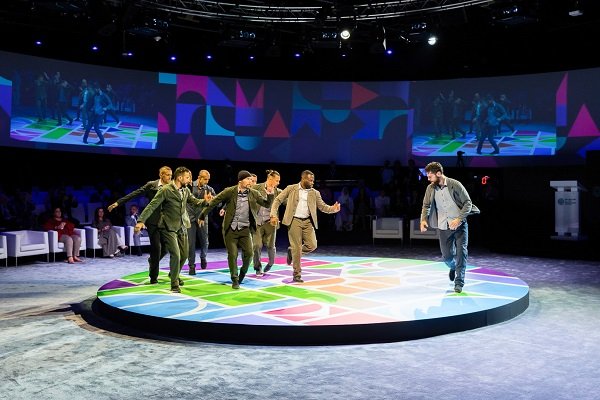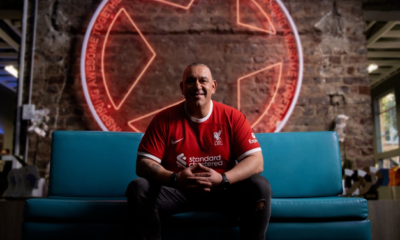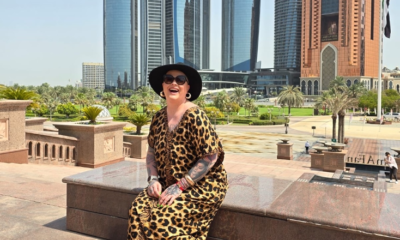Events
Culture Summit Abu Dhabi 2023 To Convene Global Thought Leaders To Reflect On The Theme ‘A Matter of Time’

The Department of Culture and Tourism – Abu Dhabi (DCT Abu Dhabi) has announced the sixth edition of its leading global forum, Culture Summit Abu Dhabi, which will return to Manarat Al Saadiyat in the UAE capital from 29 to 31 October 2023.
Held under the theme ‘A Matter of Time’, this edition will gather an exceptional collection of thought leaders from the various fields of culture such as art, heritage, media, music, museums, public policy and technology from over 90 countries, to explore our changing relation to time and how culture can change the world’s interpretation of time.
Experts, creative thinkers, artists, change makers, policy makers and leaders from the culture and creative industries will look into how this change is impacting the way culture is produced, received and consumed, and also the role that culture – which so often holds together past, present, future – could play to help us navigate this moment of inflection in the way we relate to the notion of time.
The summit sessions will shift away from ‘mechanical time’ characteristic of our contemporary era to a ‘new cultural time’ realigned with the rhythm of human awareness and nature.
This year’s programme features a multi-track agenda consisting of a series of keynotes, plenary sessions, panel discussions, artist talks, case study workshops, creative conversations, policy sessions, cultural performances, and a visual art exhibition.
First held in 2017, Culture Summit Abu Dhabi is an annual global convening that harnesses the expertise of policy makers, researchers, artists, and culture professionals to examine urgent contemporary issues facing cultural industries, with the ambition to identify ways in which culture can transform societies and communities worldwide and turn these into actions and solutions.
An extraordinary forum of knowledge exchange, debate, and policy development, Culture Summit is organised by DCT Abu Dhabi in collaboration with global partner organisations, which this year include UNESCO, Solomon R. Guggenheim Museum and Foundation, Economist Impact, the Design Museum, Google, and the Recording Academy® among others.
His Excellency Mohamed Khalifa Al Mubarak, Chairman of DCT Abu Dhabi, said: “The sixth edition of the Culture Summit Abu Dhabi will explore the role of culture in changing the world’s tempo by offering a closer look at our relation to time. As we navigate a modern, complex world, we must ask ourselves how does our relation to time impact the way we produce and consume culture now, and in the future.
We look forward to welcoming academics, policymakers and innovators from around the globe to Abu Dhabi to address this concept to drive change in the creative industries and wider cultural landscape. Culture Summit Abu Dhabi continues to be a cornerstone of a diverse cultural programme which is curated to inspire creativity and knowledge development; helping to diversify and build a knowledge-based economy.”
Each day, the Summit programme will follow a specific sub-theme to unpack how our relation to time is evolving, examine the challenges this evolution represents for the culture and creative sectors, and provide focused, functional solutions.

Day 1 – Time to Remember (The passage of time) looks at how we make sense of the course of time in an era where everyone’s attention span is altered while simultaneously, everything is recorded to be remembered forever. In that context, what is the role of culture in creating collective memories, and can we reconcile the past, present, and future to develop new productive common grounds? What alternatives to the linear concept of time can we bring to re-think a more sustainable relation to time?
Day 2 – Time to Act (Seizing the moment) sheds light on the spread of ‘fast culture’ gradually eroding critical thinking and our capacity to deal with complexity, creating significant disruptions to how culture is produced, received and consumed. In this context, Day 2 will invite speakers and attendees to explore the capability of culture and creative fields to help us slow down and navigate uncertainty and complexity with greater ease and agency.
Day 3 – Time to Share (A never-ending time) – While the future seems increasingly uncertain amidst the volatility and complexity of our time, collectively addressing shared long-term challenges, such as the climate emergency and its related crises, seems critical. How can time be a space for bringing people together and reconciling humans and nature?
Day 3 will focus on highlighting what culture can offer in the wake of new long-time horizons by introducing the notion of ‘deep time’, and the rising call to become good ancestors. This last sub-theme will also invite reflection on the global challenge of climate change and the need to bridge the gap between generations.
Ernesto Ottone R., Assistant Director-General for Culture of UNESCO, says: “2023 is a landmark year for the culture sector. At a mid-point in the implementation of the SDGs, artists and culture professionals can bring new solutions to fill existing gaps. The time is now to act for the integration of culture as a stand-alone goal in the post 2030 international development agenda.”
Kenneth Cukier, Deputy Executive Editor, The Economist, says: “As AI forges ahead, culture is vital – an expression of our human values and shared destiny. Economist Impact is honoured to be a part of the annual Culture Summit Abu Dhabi, celebrating the power of narrative to shape our individual and collective identities for progress and purpose.”
Tim Marlow OBE, Chief Executive and Director, the Design Museum, says: “Culture Summit Abu Dhabi has established itself over a relatively short time as a critical forum for bringing together cultural communities from across the world. This year feels timely in every respect and the Design Museum is relishing the prospect of staging conversations between architects, designers, dancers, choreographers, artists, philosophers, futurists, writers, and curators to explore where we are and where we might be heading.”
Anthony Nakache, Managing Director, Google MENA, says: “We’re pleased to continue our partnership with DCT Abu Dhabi at their Culture Summit to discuss how our digital products can support culture, global, and local travel. We have long supported the UAE’s rich culture and heritage through products like Google Maps, Google Arts and Culture, and YouTube, and are committed to keep doing so.”
Richard Armstrong, Director Emeritus, The Solomon R. Guggenheim Museum and Foundation, says: “The Guggenheim has developed a close relationship with DCT Abu Dhabi and Abu Dhabi audiences over the past 15 years. The Culture Summit attracts today’s most creative thinkers and makers in conversations that demonstrate our shared and hopeful future.”
Harvey Mason Jr., CEO, the Recording Academy®, and Panos A. Panay, President, the Recording Academy®, say: “We’re thrilled to partner with Culture Summit Abu Dhabi for what’s sure to be an extraordinary exchange of knowledge and ideas. Music and creative expression continue to shape human behaviour and emotion, and we look forward to collaborating with global leaders as we explore ways in which culture can change the world’s tempo.”
Additional Culture Summit Abu Dhabi partners include Anwar Gargash Diplomatic Academy, Arab World Institute, Berklee Abu Dhabi, Club de Madrid, Cultural Foundation, IFACCA, Image Nation Abu Dhabi, Louvre Abu Dhabi, NYUAD and World Cities Culture Forum, and Zayed National Museum, among others.
In previous editions of Culture Summit Abu Dhabi, the event has been marked by thought-provoking highlights and speakers including such influential figures as Madeleine Albright, Darren Walker, HE Sheikha Hoor Al Qasimi, Ruangrupa, Frank Gehry, and Trevor Noah, who have all contributed to enriching dialogues and inspiring cultural conversations.
As the result of Culture Summit 2022, DCT Abu Dhabi and UNESCO co-published the “Culture in Times of COVID-19: Resilience, Recovery and Revival” report, giving a global overview of the impact of the pandemic on the culture sector since March 2020, and outlining directions for its revival.













